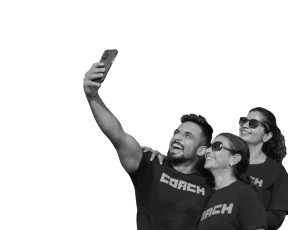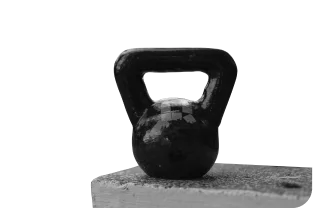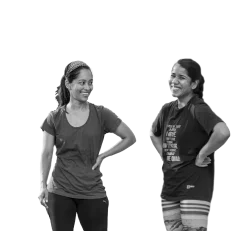Is fat loss your goal for 2024? Here's how to do it
Jan 11, 2024 ∙ 8 mins read

We all start the new year similarly, right? A raft of new resolutions, a slew of promises to ditch the 'bad' habits and 'go clean', lose the 10/20/30 lbs we have been carting around, new year / new you.... the works. We all know the drill.
Most of the drive fizzles out mid-way through the month and by the time February comes around, fat loss efforts have crashed and burned, we have put away the new sneakers, the fitness gear has lost its shine and maybe we can clean up at the next Marathon, eh what?
Let me stop you there.
What if this year, you decide not to get on this mad rollercoaster ride? After all, this has never actually worked, has it? So, why not say "Nope, I am not going to fall prey to the gimmicks, this year; I am changing tack."
It is 2024, and it is time we stopped fooling ourselves, stopped wasting time (and money!), and got on with the job at hand, right? What if we declare "I prioritize my health and no shortcuts will I entertain."
If you want your weight loss efforts to bear fruit and pave the way for long term benefits, let's get stuck in.
Fat loss 2024
And no, we are not taking the Ozempic route!
Weight loss drugs like Ozempic and Wegovy are gaining popularity thanks to social media but at the Quad, we like to stick to leaving medicine dispensation to the professionals and stick to just iron (the weights!) instead!
Do an audit

This is to get a handle on where you are currently. So be honest. And brutal! Make detailed notes of your current weight, your measurements (waist, hip, bicep/thigh/neck), your blood markers, what you eat regularly, how much screen time you get (TV, phone, video games, etc), how many hours per day you spend sitting, how many hours you move your body, and how much sleep you get. Also, include how much alcohol you consume. All of this is data and will give you a starting point.
The more detailed your initial audit, the more data points you have to fine-tune your fat loss program.
If you do not get adequate sleep, make a note of why this might be so. Is it because you are waking up at 3 am? Is it because you snore or have sleep apnea? These can be taken care of by consulting with the relevant health care provider, which is why we do this audit.
Better daily habits are necessary for long-term weight loss
Let's face it: whether we are overweight or not, moving more is vital for us. Letting your couch cushion shape itself around you will only harm you in a multitude of ways.
So what is your current activity level? Start adding to it. There are many easy ways to incorporate activity into your daily life. Some may be hard in the beginning, all require a bit of extra commitment. Make it a point not to take your car or bike to distances less than 3 kilometers. Walk to the local vendors instead of using or vehicle or an app. If you have to use your car or bike, park it further away so you get some steps in. Take the stairs.
Do not get bogged down by cardio this or HIIT that. Pick whatever you enjoy and can stick to. If it is running, then go for it. There are plenty of apps to help you get going, starting with the famous Couch to 5k. Or join a local running group. If lifting weights is your jam, find yourself a good coach. Or pick a sport - any sport. Anything that helps you move.
Remember, healthy weight is the product of the latest fad. For that, the key is consistency. So keep on moving every day.
Sleep more for fat loss

This is a bit of a tricky one, isn't it? Aren't we supposed to move more? Why is the Quad moving you the opposite way, you ask? Just hear me out! Fat loss isn't the product of a linear equation. By adding more movement and taking out the "bad foods" from your diet, you may not be able to achieve fat loss. Well, not enough of it, not for very long, especially if you do not pay attention to the third important prong: rest.
Sleep is vital. When our body is asleep, our muscles and tissues knit and repair themselves. Our memory functions get a boost. Our hormone production gets regularised, our inflammation levels go down, our appetite regulatory mechanism gets fixed and our system gets an overall recharge. When we mess with this delicate system, by staying up too late, not getting enough movement during the day, or drinking caffeine or alcohol close to bedtime, we do the equivalent of throwing a spanner in the works.
Result? Sleep disruption. Which has a knock-on effect on everything, including weight loss! Studies have shown that sleep deprivation can have a lasting impact on many of our health markers, including mental health and yes, weight loss! So, sleep more, to lose more. Ditch electronics at least an hour before bedtime, and do some gentle relaxation techniques to help you slip away into the Land of Nod.
Working towards a specific goal
Do you have a goal weight you are trying to hit? How much weight do you wish to lose? What is it based on? Body mass index is a flawed system that cannot differentiate between fat and muscle and doesn't measure an individual's body fat percentage. Better instead to pay attention to your waist circumference - this will give you an inkling of your visceral fat (fat around the organs) status and coupled with your height, give you a better indication of where you need to be.
So why do we say "work towards a specific goal"? When we have specific goals to work towards, it becomes easy to train our focus and our efforts. And not just generic goals - for best results, your goals must be specific.
Rather than saying "I need to lose X kilos" (or setting "outcome-based goals") when we shift our focus towards goals that modify our actions like "I would like to eat 5 servings of vegetables and fruits every day" or "I would like to comfortably run a mile without pausing" (or setting "behavior-based goals") we stand to achieve a higher degree of success. While outcome-based goals are excellent starting points, it is easy to fixate on them and lose track of the path needed to get there.
When we set behavior-based goals such as "I will climb up the stairs, instead of taking the lift", the way forward becomes that much less complicated.
A healthy diet is for life
The most important thing when it comes to fat loss is your food intake. The number of calories you consume, how much of your daily calorie intake is from unhealthy foods, if you resort to fast food regularly, if you are a fan of crash diets all play into it.
Fewer calories do not mean starvation. Though there are tools like intermittent fasting that can aid your fat loss efforts, it is ultimately being on a calorie deficit that is key to success.
Studies show that following a plant-based diet (not necessarily a vegan diet) or Mediterranean diet with its emphasis on healthy fats like oily fish, and olive oil, fresh fruits, and vegetables has proven to be beneficial in the long run. For bone health, muscle building, and satiety, eating protein-rich foods is an absolute necessity. Add a handful of lean protein to your plate, fill half of it with vegetables cooked in good fats, quarter-plateful of carbs and you are sorted. Do this day after day, week after week and you WILL see the results. Sure, it may take some of us longer than others, but we are in this for life!
Popular weight-loss programs induce calorie deficit by cutting out major food groups. While these might show results in the short run, they rarely prove sustainable in the long run. A healthy lifestyle means making small changes, and fad diets are not conducive to this. Work with a registered dietitian if you can, till you get a better handle on your eating habits.
Make your mental health a priority
How often do we pause to check in with ourselves, to see how we are doing? Have we ever wondered what our weight loss goals are based on? Is it the health benefits of losing excess body fat? Or is it disease control? Or is it something else entirely?
If you have ever thought "I hate my body!" or "I hate the way I look!", then chances are you aren't fully buying into the body positivity messages you are constantly bombarded with!
Constantly putting down ourselves, and feeling hatred towards our body or particular areas of our body (I hate my flabby arms/tummy/thighs/neck, etc) can do a number on our mind. Our bodies are wonderfully complex machines that put in an enormous aount of work to keep us ticking along. Instead of hating our body, what if we divert that dislike to what we are doing to harm it?
Instead of saying "I hate my body!", show it some love. Lots of love! Make de-stressing a daily habit. This could be as simple as a 5-minute medication to start your day. Or a belly breathing routine to calm your mind down before hitting the sack. There are different ways to self-care - daily journaling, guided meditation, tai chi/yoga/swimming, crocheting, etc. Try a few and find out what works for you. And make you - and your mental health - a priority!
Above all, accept that there is no magic potion
There are many, many weight loss tools out there, with more coming in every day. When we realize that the international weight loss and wellness industry generated around US$ 224.27 billion in 2021 and is scheduled to hit $405 billion by 2030, we may get an inkling why. Even as we couch surf our days away, many enterprising souls are hard at work, trying to come up with tips and tricks that promise you maximum return for minimal work.
There is no money in moderation.
In the long run, gradual weight loss brought on by the simple, sustainable methods we have listed above is the most effective way to make lasting change. Adopting healthy habits, setting realistic goals, and incorporating regular physical activity into your daily life will make your weight loss journey a much more pleasant experience.
If you are interested in enjoying better health or require guidance from seasoned professionals to achieve fat loss, get in touch with us today.



